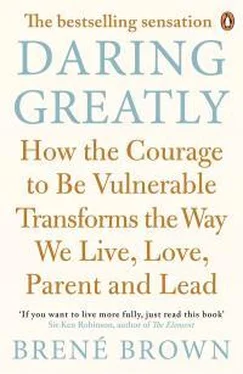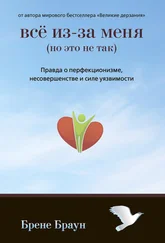Somewhere buried deep inside our hopes and fears for our children is the terrifying truth that there is no such thing as perfect parenting and there are no guarantees. From debates about attachment parenting and how much better they parent in Europe to disparagement of “tiger moms” and helicopter parents, the heated discussions that occupy much of the national parenting conversation conveniently distract us from this important and difficult truth: Who we are and how we engage with the world are much stronger predictors of how our children will do than what we know about parenting.
I’m not a parenting expert. In fact, I’m not sure that I even believe in the idea of “parenting experts.” I’m an engaged, imperfect parent and a passionate researcher. As I mentioned in the introduction, I’m an experienced mapmaker and a stumbling traveler. Like many of you, parenting is by far my boldest and most daring adventure.
From the very beginning of my research on shame, I’ve always collected data on parenting and paid close attention to how research participants talked about being parented and about parenting. The reason is simple: Our stories of worthiness—of being enough—begin in our first families. The narrative certainly doesn’t end there, but what we learn about ourselves and how we learn to engage with the world as children sets a course that either will require us to spend a significant part of our life fighting to reclaim our self-worth or will give us hope, courage, and resilience for our journey.
There’s no question that our behavior, thinking, and emotions are both hardwired within us and influenced by our environment. I wouldn’t hazard a guess on the percentages, and I’m convinced that we’ll never have a precise nature/nurture breakdown. I have no doubt, however, that when it comes to our sense of love, belonging, and worthiness, we are most radically shaped by our families of origin—what we hear, what we are told, and perhaps most importantly, how we observe our parents engaging with the world.
As parents, we may have less control than we think over temperament and personality, and less control than we want over the scarcity culture. But we do have powerful parenting opportunities in other areas: how we help our children understand, leverage, and appreciate their hardwiring, and how we teach them resilience in the face of relentless “never enough” cultural messages. In terms of teaching our children to dare greatly in the “never enough” culture, the question isn’t so much “Are you parenting the right way?” as it is: “Are you the adult that you want your child to grow up to be?”
As Joseph Chilton Pearce writes, “What we are teaches the child more than what we say, so we must be what we want our children to become.” Even though the vulnerability of parenting is terrifying at times, we can’t afford to armor ourselves against it or push it away—it is our richest, most fertile ground for teaching and cultivating connection, meaning, and love.
Vulnerability lies at the center of the family story. It defines our moments of greatest joy, fear, sorrow, shame, disappointment, love, belonging, gratitude, creativity, and everyday wonder. Whether we’re holding our children or standing beside them or chasing them down or talking through their locked door, vulnerability is what shapes who we are and who our children are.
By pushing away vulnerability, we turn parenting into a competition that’s about knowing, proving, executing, and measuring rather than being . If we put aside the question of “Who’s better?” and put down the yardsticks of school admissions, grades, sports, trophies, and accomplishments, I think the vast majority of us will agree that what we want for our children is what we want for ourselves—we want to raise children who live and love with their whole hearts.
If Wholeheartedness is the goal, then above all else we should strive to raise children who:
Engage with the world from a place of worthiness
Embrace their vulnerabilities and imperfections
Feel a deep sense of love and compassion for themselves and others
Value hard work, perseverance, and respect
Carry a sense of authenticity and belonging with them, rather than searching for it in external places
Have the courage to be imperfect, vulnerable, and creative
Don’t fear feeling ashamed or unlovable if they are different or if they are struggling
Move through our rapidly changing world with courage and a resilient spirit
For parents this means we are called upon to:
Acknowledge that we can’t give our children what we don’t have and so we must let them share in our journey to grow, change, and learn
Recognize our own armor and model for our children how to take it off, be vulnerable, show up, and let ourselves be seen and known
Honor our children by continuing on our own journeys toward Wholeheartedness
Parent from a place of “enough” rather than scarcity
Mind the gap and practice the values we want to teach
Dare greatly, possibly more than we’ve ever dared before
In other words, if we want our children to love and accept who they are, our job is to love and accept who we are. We can’t use fear, shame, blame, and judgment in our own lives if we want to raise courageous children. Compassion and connection—the very things that give purpose and meaning to our lives—can only be learned if they are experienced. And our families are our first opportunities to experience these things.
In this chapter, I want to share what I’ve learned about worthiness, shame resilience, and vulnerability specifically from my parenting research. This work has profoundly transformed the way that Steve and I think and feel about parenting. It has dramatically changed our priorities, our marriage, and our day-to-day behaviors. Because Steve is a pediatrician, we spend lots of time discussing parenting research and various parenting models. My goal here is not to teach you how to parent, but to share what might be a new lens through which to view the great dare of raising Wholehearted children.
UNDERSTANDING AND COMBATING SHAME
It’s a terrible myth to believe that once we have children, our journey ends and theirs begins. For many of us, the most interesting and productive times in our lives come after we have children. For the majority of us, the greatest challenges and struggles also come in midlife and later. Wholehearted parenting is not having it all figured out and passing it down—it’s learning and exploring together. And trust me, there are times when my children are way ahead of me on the journey, either waiting for me or reaching back to pull me along.
As I mentioned in the introduction, if you roughly divide the men and women I’ve interviewed into two groups—those who feel a deep sense of love and belonging, and those who struggle for it—only one variable separates the groups: Those who feel lovable, who love, and who experience belonging simply believe they are worthy of love and belonging. I often say that Wholeheartedness is like the North Star: We never really arrive, but we certainly know if we’re headed in the right direction. Raising children who believe in their worthiness requires us to model that journey and that struggle.
The important thing to know about worthiness is that it doesn’t have prerequisites. Most of us, on the other hand, have a long list of worthiness prerequisites—qualifiers that we’ve inherited, learned, and unknowingly picked up along the way. Most of these prerequisites fall in the categories of accomplishments, acquisitions, and external acceptance. It’s the if/when problem (“I’ll be worthy when …” or “I’ll be worthy if …”). They may not be written down, and we may not even be aware of the prerequisites, but we all have a list that says, “I’ll be worthy …”
Читать дальше






![Брене Браун - Вопреки. Как оставаться собой, когда всё против тебя [litres]](/books/436389/brene-braun-vopreki-kak-ostavatsya-soboj-kogda-v-thumb.webp)





